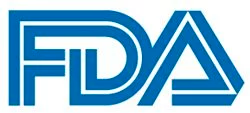FDA Grants Orphan Drug Designation to 9MW2821 for Esophageal Cancer
The FDA has granted orphan drug designation to 9MW2821 as a potential treatment for patients with esophageal cancer.
US FDA

The FDA has granted orphan drug designation to the novel NECTIN-4–targeted antibody-drug conjugate (ADC) 9MW2821 as a potential therapeutic option for patients with esophageal cancer.1
NECTIN-4 is an adhesion molecule expressed on various solid tumors, and 9MW2821 is designed to deliver monomethyl auristatin E (MMAE) to cells that express NECTIN-4.2 The agent is the first NECTIN-4–directed ADC developed by a Chinese company to enter clinical study, according to the drug’s developer, Mabwell Therapeutics.1
In February 2024, the FDA awarded fast track designation to the 9MW2821 for the treatment of patients with advanced, recurrent, or metastatic esophageal squamous cell carcinoma (ESCC).3
Data from a phase 2 study (NCT05216965) showed that patients with esophageal cancer treated with 9MW281 at a dose of 1.25 mg/kg (n = 30) experienced an overall response rate (ORR) of 30% and a disease control rate (DCR) of 73.3%. Most of this population (n = 28/30) underwent prior chemotherapy and immunotherapy.3
Additional findings from the study presented at the 2023 ESMO Congress showed that patients with advanced solid tumors treated with the ADC at a dose of 1.25 mg/kg or higher (n = 39) achieved an ORR of 38.5%, a confirmed ORR of 33.3%, and a DCR of 84.6%.2 Patients with urothelial cancer (n = 18) experienced an ORR of 55.6%, a confirmed ORR of 50.0%, and a DCR of 94.4%.
Regarding safety for all patients treated with the 1.25-mg/kg dose (n = 85), any-grade and grade 3 or higher treatment-related adverse effects (TRAEs) occurred in 63.5% and 35.3% of patients, respectively. The rate of serious TRAEs was 16.5%. TRAEs led to treatment discontinuation, dose reduction, and treatment interruption in 1.2%, 3.5%, and 28.2% of patients, respectively.
The most common TRAEs included decreased white blood cell count (any-grade, 35.3%; grade ≥3, 17.6%), neutropenia (35.3%; 18.8%), nausea (18.8%; 0%), increased aspartate aminotransferase (22.4%; 1.2%), rash (17.6%; 1.2%), alopecia (17.6%; 0%), fatigue (17.6%; 1.2%), decreased appetite (17.6%; 0%), anemia (14.1%; 2.4%), vomiting (17.6%; 0%), and peripheral sensory neuropathy (16.5%; 0%).
The study enrolled patients between 18 and 80 years of age with locally advanced or metastatic solid tumors, excluding sarcoma, who had an ECOG performance status of 0 or 1 and adequate organ function.2,4 Patients also needed to have a life expectancy of at least 3 months and measurable disease per RECIST 1.1 criteria. During the expansion cohort of the study, patients were required to submit tumor tissue to assess NECTIN-4 expression.4
Patients could not have uncontrolled diabetes, active central nervous system metastases, or severe corneal diseases.2 Other key exclusion criteria included preexisting grade 2 or higher peripheral neuropathy, prior treatment of NECTIN-4–targeted ADC with MMAE payload, and a documented history of clinically significant cardiac or cerebrovascular disease within 6 months of enrollment.4
In the dose-escalation and -expansion study, patients received 9MW2821 on days 1, 8, and 15 of each 28-day cycle. Doses ranged from 0.33 mg/kg to 1.0 mg/kg to 1.25 mg/kg to 1.5 mg/kg.2
Safety, preliminary antitumor activity, and pharmacokinetics served as the trial’s key end points.
9MW2821 will be further investigated in a phase 3 trial (NCT06196736), which will evaluate the ADC vs investigator’s choice of chemotherapy in patients with locally advanced or metastatic urothelial carcinoma who have received prior treatment with an immune checkpoint inhibitor and platinum-containing chemotherapy.5 A phase 1/2 trial (NCT06079112) will also investigate 9MW2821 in combination with toripalimab-tpzi (Loqtorzi) in patients with locally advanced or metastatic urothelial cancer.6
References
- FDA grants orphan drug designation to 9MW2821. News release. Mabwell Therapeutics. May 6, 2024. Accessed May 8, 2024. https://www.mabwell.com/en/news_info/id-146.html
- Zhang J, Liu R, Gao S, et al. Preliminary results from a phase I/II study of 9MW2821, an antibody-drug conjugate targeting nectin-4, in patients with advanced solid tumors. Ann Oncol. 2023;34(suppl 2):S464. doi:10.1016/j.annonc.2023.09.1845
- FDA grants fast track designation to 9MW2821. News release. Mabwell. February 25, 2024. Accessed May 8, 2024. https://www.mabwell.com/en/news_info/id-134.html
- A clinical study of 9MW2821 in subjects with advanced malignant solid tumors. ClinicalTrials.gov. Updated June 15, 2022. Accessed May 8, 2024. https://clinicaltrials.gov/study/NCT05216965
- A study to evaluate 9MW2821 versus chemotherapy in subjects with previously treated locally advanced or metastatic urothelial cancer. ClinicalTrials.gov. Updated January 9, 2024. Accessed May 8, 2024. https://clinicaltrials.gov/study/NCT06196736
- 9MW2821 combined with toripalimab injection in subjects with local advanced or metastatic urothelial cancer. ClinicalTrials.gov. Updated October 12, 2023. Accessed May 8, 2024. https://clinicaltrials.gov/study/NCT06079112



